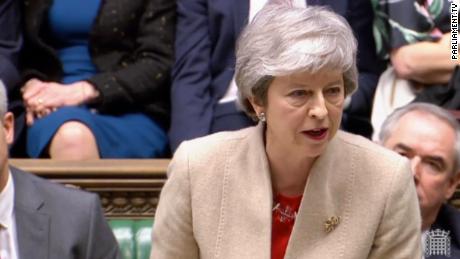Theresa May has suffered a parliamentary defeat on a third attempt to pass her Brexit deal through the UK House of Commons, leading the prime minister to warn that parliament was “reaching its limits” in finding an agreed exit from the EU.
May had sought approval for her deal on the UK’s withdrawal from the EU on what had long been scheduled to be Brexit day.
Instead MPs voted by 286 to 344 against the EU divorce treaty, which if passed would have opened the way to Britain leaving the EU on a revised date of May 22.
Speaking after the result, which she lost by 58 votes, Mrs May said: “The implications of the House’s decision are grave.” “The legal default now is that the United Kingdom is due to leave the European Union on 12 April. In just 14 days’ time.”
Amid speculation she could be forced to call a general election, she added: “I fear we are reaching the limits of this process in this House.” In immediate response to the deal’s defeat, Donald Tusk, the president of the European Council of EU member states, called an emergency EU debate.
“In view of the rejection of the Withdrawal Agreement by the House of Commons, I have decided to call a European Council on 10 April. #Brexit,” he said on Twitter. Britain is now due to leave the EU on April 12 without a deal unless Mrs May can persuade the 27 other EU leaders to grant a further extension in the Article 50 exit process.
This would, however, require the UK to take part in European Parliament elections in May.
A total of 41 Tory MPs backed Mrs May’s deal for the first time today as well as two Labour MPs — Rosie Cooper and Jim Fitzpatrick.
But in a huge blow to the prime minister’s authority, 34 of her own backbenchers voted it down on Friday. MPs are set to hold another series of “indicative votes” on potential Brexit alternatives next week, including the option of remaining a permanent membership of the customs union.
But Mrs May’s allies indicated she would continue to seek the support of MPs for her deal and haven’t ruled out bringing it back for a further vote next week. The speaker John Bercow has previously warned Mrs May her deal cannot be repeatedly presented to the Commons without substantial changes.
“Clearly it was not the result we wanted. But, that said, we have had a number of senior Conservative colleagues who have felt able to vote with the government today,” an ally of Mrs May said.
“They have done so in higher numbers than previously. Clearly there is more work to do. We are at least going in the right direction.” Dominic Raab, the Eurosceptic former Brexit secretary, announced he would vote for the withdrawal agreement on Friday morning.
Crucially, 10 MPs from Northern Ireland’s Democratic Unionist party, which give Mrs May her parliamentary majority, maintained their opposition to the withdrawal agreement. The DUP says it cannot accept the so-called “backstop” to prevent a hard Irish border, which could keep Northern Ireland — but not the rest of the UK — within the EU’s single market for goods.
Speaking after the vote, the party’s leader in Westminster called on Mrs May to return to Brussels and secure legally binding changes on the backstop that would ensure Northern Ireland is not treated differently.
Nigel Dodds told MPs: “The Democratic Unionist Party has consistently and repeatedly indicated that we could not support the Withdrawal Agreement because of the construction of the backstop.
“We have reached this view from a principled position as we do not believe the Withdrawal Agreement is the best way forward for the United Kingdom.”
The party tweeted: “The backstop has always been the problem. The backstop remains the problem. Use the time constructively to deal with the problem.” Steve Baker, vice-chair of the hardline anti-EU European Research Group, called on Mrs May to resign.
“This must be the final defeat for Theresa May’s deal,” he said in a statement. “It’s finished. And we must move on. It has not passed. It will not pass.”
(Financial Times)

